
Travel is not only a gateway to discovering new cultures and landscapes but also a powerful means to promote physical and mental well-being. This article explores the intricate relationship between travel and health, emphasizing how embarking on journeys can contribute to a healthier, happier life.
Physical Activity and Exploration: Travel often involves physical activity, whether it’s hiking in the mountains, strolling through historic cities, or swimming in pristine waters. These activities promote fitness and help travelers stay active, reducing the risk of sedentary lifestyle-related health issues.
Stress Reduction and Relaxation: Escaping from the daily grind and immersing oneself in a new environment can be a great stress-reliever. Travel allows individuals to disconnect from their regular routines, leading to reduced stress levels and improved mental health.
Cultural Exploration and Mindfulness: Engaging with different cultures and traditions during travel can be a form of mindfulness. It encourages open-mindedness, empathy, and a deeper understanding of the world, which can contribute to better mental health.
Vitamin D and Sun Exposure: Many travel destinations offer ample opportunities for sun exposure. Sunlight is a natural source of vitamin D, essential for bone health and overall well-being. However, it’s important to practice sun safety to avoid skin damage.
Adventure and Risk-Taking: Engaging in adventurous activities while traveling can boost adrenaline and provide a sense of accomplishment. These experiences can enhance self-esteem and foster resilience.
Healthy Eating and Culinary Exploration: Exploring local cuisine can be a delightful part of travel. Trying new foods and flavors can broaden one’s palate and promote healthier eating habits.
Social Connections and Emotional Health: Travel often involves meeting new people and forming social connections. These interactions can combat loneliness, enhance emotional well-being, and create lasting friendships.
Disconnecting from Technology: Travel allows individuals to disconnect from the constant demands of technology and screens. This digital detox can improve sleep quality and reduce the negative impacts of excessive screen time on mental health.
Rest and Recovery: Vacations provide an opportunity for rest and recovery, essential for overall health. Adequate sleep and relaxation during travel can rejuvenate the body and mind.
Mindful Planning and Precautions: While travel can contribute to health and wellness, it’s important to plan carefully and take necessary health precautions. This includes vaccinations, travel insurance, and awareness of local health resources.
In conclusion, travel can be a powerful catalyst for improved physical and mental health. It offers opportunities for physical activity, relaxation, cultural enrichment, and social connections. However, travelers should approach their journeys mindfully, prioritizing health and safety to fully enjoy the benefits of travel on their well-being.







